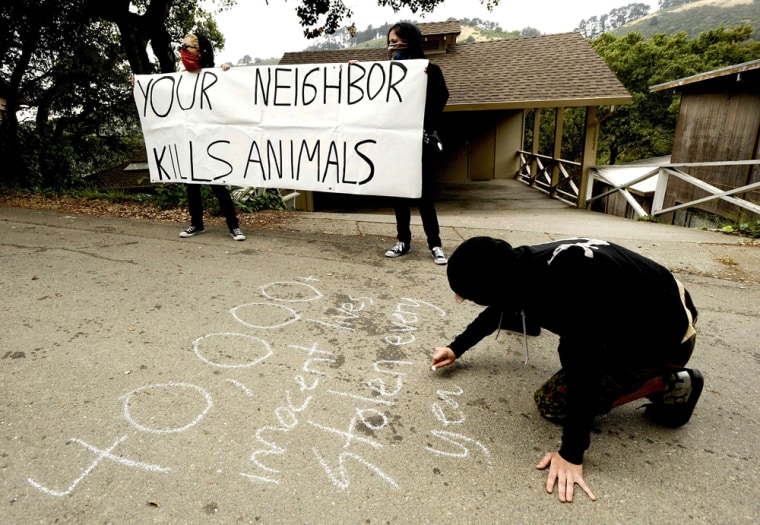The FBI is investigating two firebombings targeting scientists at the University of California, Santa Cruz, as the latest in a rash of attacks against biomedical researchers who experiment on animals, authorities said.
One scientist and his family, including two small children, were forced to flee from a second-story window Saturday after a firebomb was lit on their front porch, filling the off-campus house with smoke, Santa Cruz police said. An adult was treated for minor injuries at a hospital and released.
Police were investigating the attack as attempted murder, said Santa Cruz police Capt. Steve Clark.
"That device had a real potential to put that family in jeopardy," Clark said. He described the bomb as a "Molotov cocktail on steroids."
A sprinkler system and a neighbor with a garden hose helped keep the fire from spreading before firefighters arrived to extinguish it, Clark said.
Also Saturday morning, a firebomb destroyed a car belonging to another researcher parked at faculty housing on campus. Investigators said they were treating the attacks as "domestic terrorism."
'Animal abusers ... beware'
The attacks came four days after police obtained threatening animal rights pamphlets left at a Santa Cruz coffeehouse containing the names and home addresses of UC Santa Cruz scientists.
"Animal abusers everywhere beware," the pamphlets read. "We know where you live."
Molecular biologist David Feldheim, whose front door was charred, was among the researchers on the list, the Santa Cruz Sentinel reported. According to his Web site, Feldheim's lab uses mice to study the development of brain functions involved in eyesight.
Authorities would not identify the researcher whose car was destroyed but said that person's name was not listed in the pamphlet.
A spokesman for the North American Animal Liberation press office, which commonly posts messages from groups taking credit for animal rights violence, issued a statement Sunday saying it had not received any claims of responsibility for the attacks.
"It's regrettable that certain scientists are willing to put their families at risk by choosing to do wasteful animal experiments," press office spokesman Jerry Vlasak said in the statement.
Masked protestors
Police said they have no suspects in Saturday's attacks, the first against UC Santa Cruz scientists since February, when animal rights activists showed up at the house of a breast cancer researcher during her young daughter's birthday party.
The masked protesters pounded on the front door, and one threw a punch at the researcher's husband as he tried to chase them away, according to police. The FBI is still investigating that case.
In recent years, three UCLA researchers who use non-human primates have been targeted with firebombs, though two failed to ignite. Animal rights groups claimed responsibility for all three attacks.
More recently, masked protesters targeting the University of California, Berkeley, have scrawled graffiti and broken windows at scientists' homes.
FBI investigators say the incidents at different universities are probably not centrally coordinated. But authorities said the attacks do share tactics, including the public posting of researchers' personal information and the type of firebomb used.
"These are odious assaults on individuals and on the principles of free inquiry by which we live," UC Santa Cruz Chancellor George Blumenthal said in a statement Saturday.
Police said they were offering stepped-up security to the 13 UC Santa Cruz researchers whose names appeared in the pamphlets discovered last week.
